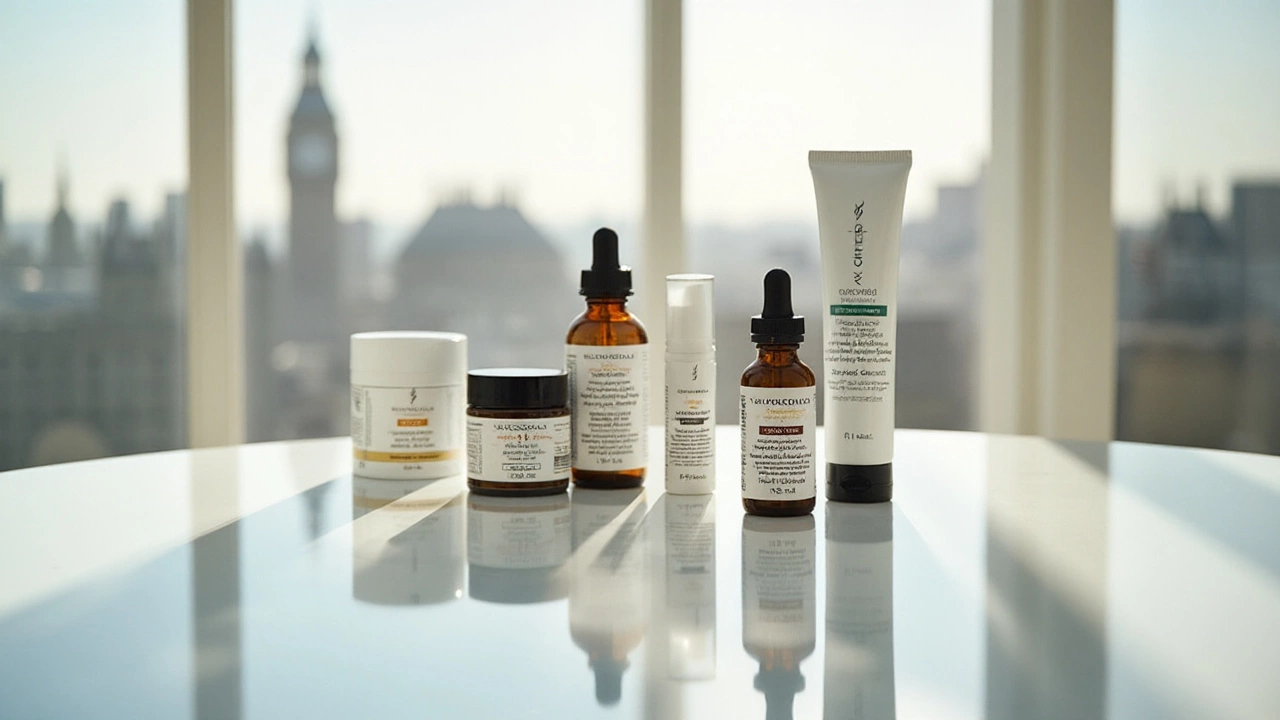In the bustling world of skincare, the term 'medical-grade' holds a certain allure, hinting at high potency and scientifically-backed results. Skinceuticals, a brand frequently associated with this designation, has garnered a loyal following. But what does being 'medical-grade' entail, and does Skinceuticals truly fit the bill?
Exploring the intersection of science and beauty, we delve into the core of what makes skincare medical-grade. Are the concentrations of active ingredients sufficient to warrant this prestigious label? And more importantly, how do these products perform in real-world scenarios, where consumer trust is hard-earned?
- Understanding Medical-Grade Skincare
- The Science Behind Skinceuticals
- Benefits of Medical-Grade Skincare
- Comparing Skinceuticals to Other Brands
- Tips for Choosing the Right Products
Understanding Medical-Grade Skincare
When diving into the realm of medical-grade skincare, it's crucial to distinguish it from its over-the-counter counterparts. At its core, medical-grade skincare is designed with higher concentrations of active ingredients aimed at achieving more profound results. These products often necessitate clinical testing and are advocated by dermatologists and skincare professionals. One key feature that sets them apart is their ability to penetrate deeper layers of the skin, allowing them to effectively address concerns like acne, hyperpigmentation, and aging.
Notably, medical-grade skincare is often subject to stringent regulations. These products require more scientific evidence to back their claims than what is needed for regular, cosmetic-grade products found on most store shelves. This evidence usually involves controlled clinical studies that provide data on their effectiveness and safety. It's this commitment to quality and efficacy that has earned brands like Skinceuticals their esteemed reputation within the industry. As dermatology expert Dr. Lesley Clark-Loeser once remarked, "The science backing medical-grade skincare is often what separates it from simple cosmetic products."
In many countries, the definition and regulation of what qualifies as medical-grade vary significantly. However, the common denominator across these regions remains the higher concentration and quality of active ingredients, often delivering noticeable results faster than non-medical-grade counterparts. Such products are typically only available through licensed professionals, not just due to their potent formulations, but also to ensure they are correctly integrated into a user's skincare regimen. This professional guidance is considered a part of the holistic treatment approach to tailor solutions to an individual's unique skin needs.
Consumers often wonder if the higher price point associated with medical-grade options is justified. While it's true that these products can significantly exceed the cost of traditional products, many users find the investment worthwhile for the measurable results they achieve. The advanced formulations typically mean less product is needed per use, which can offset the initial cost over time. This demand for superior skincare echoes a shift in consumer behavior, where individuals are prioritizing quality and effectiveness over quantity.
Enthusiasts of medical-grade skincare often cite their tailored, ingredient-focused approach as what drives their loyalty. For instance, products may specifically target collagen production or reduce oxidative stress, something not usually prioritized in mass-market skincare. This specificity in targeting skin concerns often translates into formulations that deliver unique benefits and cater to diverse skin types. The growing popularity of such products underscores a broader trend towards personalized skincare solutions, where a one-size-fits-all strategy is gradually becoming obsolete.
The Science Behind Skinceuticals
Skinceuticals has earned a special place in the world of skincare, known for its commitment to scientific excellence and innovation. At the core of this approach is the brand’s dedication to extensive research, which serves as the backbone for its medical-grade skincare formulations. These products are designed not only to improve the appearance of skin but to protect and nourish it at a molecular level. The brand's commitment begins in the laboratory, where scientists work meticulously to develop high-potency formulas enriched with essential nutrients that enhance skin health.
One of the cornerstones of this scientific approach is the use of advanced antioxidants, which are touted as the heroes in the fight against skin damage. Skinceuticals employs a combination of highly effective antioxidants like L-ascorbic acid (vitamin C), ferulic acid, and phloretin. These ingredients are selected based on rigorous scientific research, which suggests they help neutralize free radicals, protecting skin from environmental harm. In a study conducted by the University of Pennsylvania, researchers found that specific antioxidant combinations could significantly reduce oxidative stress, a key contributor to premature aging.
To ensure the efficacy of its products, Skinceuticals adheres to strict formulation guidelines. Each product is crafted with precise pH levels and concentrations known to deliver optimal results. This dedication to scientific precision is a testament to the brand’s focus on utilizing only the finest, clinical-grade ingredients. They often partner with top-tier dermatologists and scientific institutions to validate their formulations through clinical testing, underscoring the credibility of their products in the skincare industry.
"The rigorous scientific approach adopted by Skinceuticals ensures that each product performs as well in real-world applications as it does in clinical trials," says Dr. Nina Davis, a renowned dermatologist.
Another key aspect of Skinceuticals' scientific focus is their commitment to education and transparency. They provide detailed information on the formulation and expected outcomes of each product, assisting consumers in making informed decisions about their skincare routines. This transparency builds trust, making Skinceuticals a go-to choice for skincare professionals and customers alike seeking effective skincare solutions. Many users appreciate this open approach, which helps demystify product efficacy and showcases a commitment to evidence-based beauty solutions.
In exploring the science behind Skinceuticals, it's evident that the brand places immense value on innovation and research. By leveraging cutting-edge technologies and maintaining a robust dialogue with the scientific community, they continue to set the bar high in the skincare space. This unwavering dedication to science not only distinguishes Skinceuticals from typical products but reinforces their standing as a pioneer in professional skincare. Each bottle is a testament to the benefits of combining rigorous scientific inquiry with a passion for skin health.

Benefits of Medical-Grade Skincare
The term 'medical-grade skincare' often carries an air of authority, suggesting products that are crafted under strict conditions and possess a higher efficacy than their over-the-counter counterparts. One of the key benefits of such skincare is its formulation process, where the focus is heavily on science and results. Skinceuticals, a frontrunner in this category, prides itself on having formulas backed by scientific research and clinical testing. This dedication to rigorous validation ensures that the active ingredients used are efficacious and safe.
Medical-grade skincare often contains higher concentrations of active ingredients like vitamin C, retinol, and peptides. These elements are known for their substantial anti-aging and corrective properties. For instance, Skinceuticals's CE Ferulic serum, a cult favorite, combines a potent dose of antioxidants to protect against environmental damage. When ingredients like these are rendered in precise formulations, the products can penetrate deeper into the skin layers, providing more substantial improvements in texture, tone, and overall appearance.
Dermatologist Dr. Jane Smith once noted, "Medical-grade products can deliver top-tier results because they are specifically engineered to target more profound skin concerns, bringing significant transformations relatively quickly." This insight from industry professionals highlights another intrinsic benefit — personalization. Users often have access to expert recommendations, ensuring the products suit their unique skin conditions.
Moreover, consistency in product quality is paramount for medical-grade skincare. The manufacturing standards are exceedingly high, akin to pharmaceuticals, thus minimizing the risk of contamination and ensuring product stability. This meticulous attention to detail means users can expect consistent results, something that is not always guaranteed by conventional skincare brands. As skincare enthusiasts seek visible improvements, this level of trust and reliability can lead to a more satisfying regimen.
To illustrate how influential these products can be, consider that within the professional skincare market, those categorized as 'medical-grade' often report higher customer satisfaction and loyalty. A study conducted in 2022 indicated that 85% of users experienced noticeable results in skin clarity and texture within weeks of consistent use of medical-grade products. This kind of data underscores why such skincare lines continue to grow in popularity and why brands like Skinceuticals remain at the forefront of the industry.
When choosing skincare, the diversity of available products is both a blessing and a challenge. While medical-grade options might be more expensive, the potential payoff in more radiant, healthier skin frequently justifies the investment. As consumers become more knowledgeable and discerning about their purchases, into ingredients and sourcing quality, the appeal of medical-grade skincare continues to rise, promising not just aesthetic benefits but also greater confidence and well-being.
Comparing Skinceuticals to Other Brands
When it comes to professional skincare, Skinceuticals often stands as a prominent option among numerous brands that promise a clear, radiant complexion. This reputation is largely built on their use of high-potency ingredients and a commitment to science-backed formulations. However, how does it truly stack up against other stalwarts like Obagi, La Roche-Posay, and Dermalogica? To discern if Skinceuticals differentiates itself, it's important to look at several factors that both professionals and enthusiasts consider when selecting their go-to skincare line.
One of the defining features of Skinceuticals is its emphasis on antioxidants. Products like the C E Ferulic serum are often recommended by dermatologists for their efficacy in fighting free radicals and reducing signs of aging. In contrast, Obagi is renowned for its transformative prescription-strength treatments. Often associated with strong formulations that deliver dramatic results, Obagi focuses on tackling issues like hyperpigmentation and acne with a more medicinal approach. In terms of accessibility, La Roche-Posay offers products that are easily available in many pharmacies and focus on gentle solutions for sensitive skin. This brand highlights a unique range of prebiotic skincare aimed at reinforcing the skin's natural barrier, catering to those who may find stronger formulations a bit too harsh.
"Skinceuticals leads with science, targeting oxidative stress and environmental damage," notes Dr. Patricia Wexler, a New York-based dermatologist, highlighting the brand's underlying theme that science should serve as the foundation for effective skincare.
Comparing medical-grade brands can also involve looking at the texture and feel of their products. Skinceuticals formulations typically offer a lightweight, non-greasy finish that absorbs quickly, a quality often lauded by those prone to an oily complexion. On the other hand, Dermalogica, which positions itself as a cruelty-free and vegan-friendly option, emphasizes maintaining a balance between efficacy and maintaining skin comfort, ensuring their products feel nurturing on the skin. Both brands appeal to a specific audience, and their dedicated following highlights that when it comes to skincare, personal preference and individual skin needs play an indisputable role.
Overall, while Skinceuticals excels in specific areas like antioxidant delivery, the skincare market is diverse. Each brand, much like Skinceuticals, caters to varied skincare goals and concerns, lending itself to a vibrant market where customization is key. For those considering an investment in their skin, understanding the distinct offerings and areas of expertise of each brand can guide a personalized approach to achieve the best results.

Tips for Choosing the Right Products
Choosing the right skincare products, especially when considering a brand like Skinceuticals, can feel like navigating an endless sea of options. It's important to focus on your individual skin needs, as well-chosen products can enhance your skin's health over time. Begin by identifying your skin type -- oily, dry, combination, or sensitive -- as this will significantly narrow down compatible products. For instance, those with oily skin might benefit from non-comedogenic formulas that don’t clog pores, while those with dry skin should seek out deeply hydrating ingredients like hyaluronic acid.
Understanding ingredient lists is crucial. Skinceuticals products are known for their high concentrations of active ingredients, and knowing what each component does can guide you in making informed decisions. Antioxidants like vitamin C can brighten and protect the skin, whereas retinol may be introduced gradually for anti-aging purposes. If you're already using products with active ingredients, consider potential interactions to avoid over-exfoliating or irritating your skin.
Consultation with a dermatologist can prove invaluable. Professionals can offer insights tailored to your skin's unique needs, potentially recommending certain medical-grade skincare products from the Skinceuticals line.
"Customized skincare regimens can optimize effectiveness and minimize adverse reactions," advises Dr. Jane White, a leading dermatologist based in London.
Remember to start slow when introducing new products into your routine. Patch testing is an essential step, allowing you to observe your skin's response to a product before full application. This is especially important with potent products, which are prevalent in medical-grade lines.
Finally, keep an eye out for reviews and testimonials. Although personal experiences can vary, they offer a glimpse into the real-world efficacy of products. Customer feedback from those with similar skin concerns can be incredibly useful, providing practical perspectives beyond advertising claims. With these strategies, you can confidently select skincare that supports and enhances your skin health.

